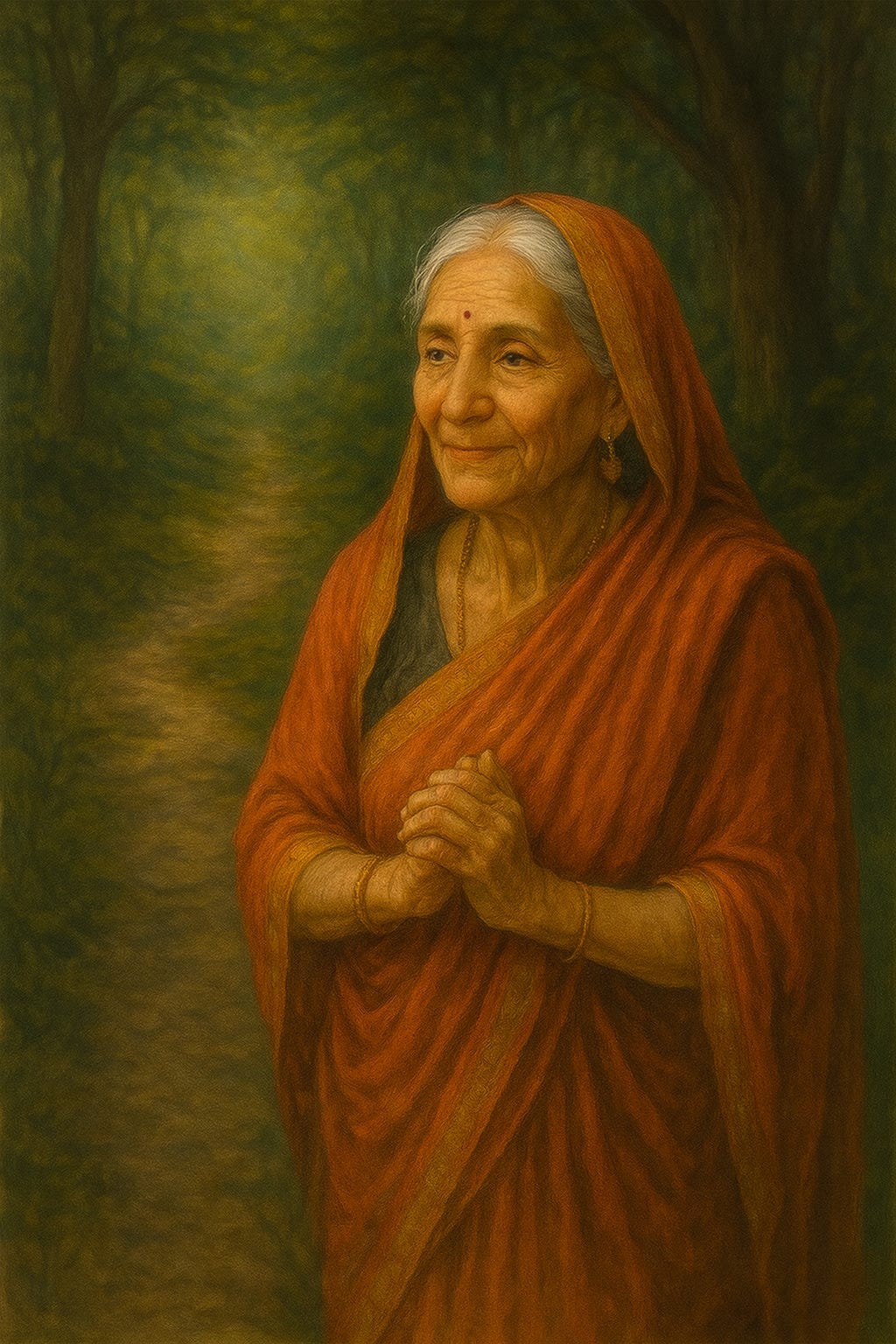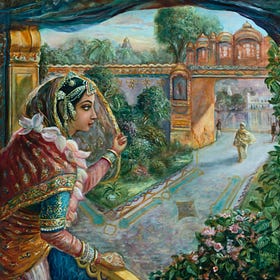Queen Arci follows her husband to the end
Arci had great affection for her husband, whom she served and meditated upon her whole life. Then, at the very end, Pṛthu Maharaja left his body, leaving her alone. What did she do after this?
Queen Arci appeared together with Pṛthu Maharaja from the dead body of Vena. Just as Pṛthu is an empowered incarnation of Lord Viṣnu, Arci is an empowered incarnation of Lakṣmī-devī. Although she is not mentioned much in the description of the Śrīmad-Bhāgavatam, she followed him as an exemplary wife, including the time he was practicing austerities in the forest. It is described that she was following him in his austerities, lying down on the ground, eating only fruits, flowers, and leaves, etc. Due to these severe austerities, she became very frail and thin. Still, because she felt pleasure in serving her husband, she did not notice these difficulties. Just as Pṛthu Maharaja gave the example of the perfect king and ascetic, Arci gave the example of a perfect, dedicated wife.
In traditional Vedic culture, men are supposed to practice austerities and pursue spiritual advancement, while women can advance by simply accepting a spiritually advanced man and serving him. Men practice austerity by directly controlling their senses, both in householder life and in renounced life, and living a life of devotion to the Lord, while women can control their senses in a different way, by becoming dedicated wives and mothers. These roles are prescribed in observance of the natural propensities of both, giving both the best opportunities to advance.
As Srila Prabhupada explains: "The words bhartur vrata-dharma-niṣṭhayā indicate that a woman’s duty, or religious principle, is to serve her husband in all conditions. In Vedic civilization a man is taught from the beginning of his life to become a brahmacārī, then an ideal gṛhastha, then vānaprastha, then sannyāsī, and the wife is taught just to follow the husband strictly in all conditions of life. After the period of brahmacarya, a man accepts a householder’s life, and the woman is also taught by her parents to be a chaste wife. Thus when a girl and boy are united, both are trained for a life dedicated to a higher purpose. The boy is trained to execute his duty in accordance with the higher purpose of life, and the girl is trained to follow him. The chaste wife’s duty is to keep her husband pleased in householder life in all respects, and when the husband retires from family life, she is to go to the forest and adopt the life of vānaprastha, or vana-vāsī. At that time the wife is to follow her husband and take care of him, just as she took care of him in householder life. But when the husband takes the renounced order of life, namely sannyāsa, the wife is to return home and become a saintly woman, setting an example for her children and daughters-in-law and showing them how to live a life of austerity."
From this, we can understand the affection Arci had for her husband, whom she served and meditated upon her whole life. Then, at the very end, Pṛthu Maharaja left his body, leaving her alone. What did she do after this?
The Śrīmad-Bhāgavatam mentions that the queen lamented after her husband passed away, but just for a little while. Lamentation was natural due to affection, but at the same time, the queen had a perfect philosophical understanding of the immortality of the soul. Apart from that, she still had duties to perform, cremating the body and performing other funeral functions. She made a funeral pyre from firewood collected from the forest and placed the body of her husband on top. After bathing in the river for purification, she performed satī, entering the funeral pyre and leaving together with her husband. This is, of course, not observed nowadays, but in bygone eras, it was an accepted option for a widow who would feel the separation from her husband to be more painful than the flames of the funeral pyre.
Observing the great sacrifice of Arci, the wives of the demigods offered prayers to her and showered flowers. Talking amongst themselves, they commented: "All glories to Queen Arci! We can see that this queen of the great King Pṛthu, the emperor of all the kings of the world, has served her husband with mind, speech and body exactly as the goddess of fortune serves the Supreme Personality of Godhead, Yajñeśa, or Viṣṇu. Just see how this chaste lady, Arci, by dint of her inconceivable pious activities, is still following her husband upward, as far as we can see." (SB 4.23.25-26)
Both Pṛthu and Arci went back to Vaikuṇṭhaloka in their spiritual bodies, each on his own airplane, passing through the realms of the demigods. The ladies from Svargaloka could see their bodies burning down on Earth, and at the same time, see the two airplanes passing through them and going upwards.
Pṛthu and Arci were destined to live together in one of the Vaikuṇṭha planets as husband and wife, as it is common for couples who practice and attain perfection together.
How is this possible? Prabhupada explains: "Pṛthu Mahārāja, being topmost amongst self-realized souls, certainly returned home, back to Godhead, and attained one of the Vaikuṇṭha planets. Queen Arci also entered Patiloka, but this planet is not in the material universe, for she actually entered the planet which her husband attained. In the material world also, when a woman dies with her husband, she again unites with him in the next birth. Similarly, Mahārāja Pṛthu and Queen Arci united in the Vaikuṇṭha planets. In the Vaikuṇṭha planets there are husbands and wives, but there is no question of their giving birth to children or having sex life. In the Vaikuṇṭha planets both husbands and wives are extraordinarily beautiful, and they are attracted to one another, but they do not enjoy sex life. Indeed, they consider sex not to be very relishable because both husband and wife are always absorbed in Kṛṣṇa consciousness and in glorifying and chanting the glories of the Lord."
How to get there? How to live in this life in such a way that our family life may foment our spiritual life instead of being a hurdle? One of the difficulties with family life is that it tends to foster a mentality of enjoyment, which starts with sexual attraction and branches out into so many material needs that are not so favorable for spiritual advancement. The way to counteract this is to connect our family life with the service of the Lord. When the Lord becomes the central focus, we lose the attraction for materialistic life, and we have a chance of making our family life transcendental.
The mentality of Queen Arci is, of course, very different from the prevailing mentality nowadays. Arci was so dedicated to her husband that she couldn't remain separated from him, while in modern times, divorces are so common. Certainly, we can learn something from the examples of such exalted couples.
Most inhabitants of the celestial planets pass their time enjoying the opulence and possibilities of sense gratification available there, and thus, after such a long life of enjoyment, they return to Earth for another birth. Their time is thus essentially wasted. Human beings, however, have short lives, and for one seriously engaged in devotional service, that's an advantage, because it allows one to quickly return back home, back to Godhead. To waste such an opportunity is considered the greatest loss.
Read also:
The male fantasy of a submissive wife
Subscribe for free to receive new posts by email. If you are already a subscriber and appreciate what I'm doing, you can consider becoming a paid subscriber to support my work. There is also a button to donate below.
If you read this article to the end, give it a like. This makes Substack recommend it to more people.




Hare Krishna Prabhu ji 🙏 very nicely described the real duty of husband and wife , and how to live happily in family life and return back to godhead together. 😊